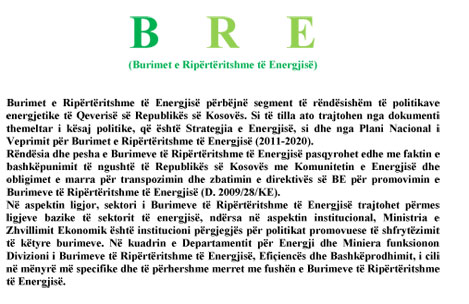Renewable Energy Sources (RES)

The Government of the Republic of Kosovo has issued Decision on incentives for RES (2007-2013), the main of which are:
- Approval by ERO tariff incentives (feed-in tariffs) for some types of RES, such as electricity generated by small hydro up to 10 MW, (63.3 € / MWh) wind energy (€ 85 / MWh) and energy produced from biomass (71.3 € / MWh). With new targets forecast energy production from RES targets are expected to be part of the photovoltaic energy for which will be set feed-in tariffs.
- Acquisition of energy priority RES, the operator of the electricity distribution.
- Mandatory Buying Power Distribution Operator of the entire quantity of electricity produced from RES, even when this energy exceeds the energy requirements;
Click here: Legislation
Click here: Strategies
Ministry of Economic Development (MED)
Role:
– Development of RES development policy- Development of an action plan for RES
– Overseeing the implementation of policies for RES
– Determination of REE targets.
Energy Regulatory Office (ERO)
Role:
– Implementation of the regulatory framework
– Definition of feed-in tariffs
– Issuance , modification , suspension or withdrawal of licenses / authorizations
– Preparation of tariff methodology,
– Development of the authorization procedures for the construction of new generating capacity to power,
– Issuance of certificates of origin;
– Ensure that transmission and distribution tariffs for connection and use of transmission systems and distribution , not to discriminate against electricity from RES backgrounds
Transmission System Operator (KOSTT) and Distribution System Operator (DSO)
Role:
– Ensure system connectivity in any new producer of electricity from RES and cogeneration ,
– Assessment of the cost of connecting to the system
– Determination and publication of KOSTT ( and DSO ) standard rules relating to the sharing of costs for installation of systems , such as grid connections and reinforcements in between all electricity producers benefiting from them .Institutional Framework
Publications
Energy Strategy of the Republic of Kosovo 2022 2031
ELECTRICITY AND THERMAL ENERGY BALANCE 2020
ANNUAL ENERGY BALANCE OF REPUBLIC OF KOSOVO FOR THE YEAR 2016
LONG TERM ENERGY BALANCE OF THE REPUBLIC OK KOSOVO 2015-2024
ANNUAL ENERGY BALANCE OF REPUBLIC OF KOSOVO FOR THE YEAR 2015
ANNUAL (REALIZED) ENERGY BALANCE OF REPUBLIC OF KOSOVO FOR THE YEAR 2011
ANNUAL ENERGY BALANCE OF REPUBLIC OF KOSOVO FOR THE YEAR 2013
ANNUAL ENERGY BALANCE OF REPUBLIC OF KOSOVO FOR THE YEAR 2012
Regulation No.02/2012/Mf for Fees on Access to Public Documents
Progress Report 2012 – Mining Strategy Development Program 2012-2014
Long term energy balance of the Republic of Kosovo 2013 – 2022
Annual (Realized) Energy Balance Of Republic Of Kosovo For The Year 2010
Projects and studies conducted in the field of RES expectations and incentives
– Pre-feasibility study to identify potential wind energy in Kosovo (2010) partially
– Study on preparation of project data for systems using solar energy in Kosovo – 2010
– Study on the development of energy production from biofuels (2012)
– Promotional campaign for EE and RES (2012-2013)
Procedures for Investment in the Energy
Steps to be followed and the institutions responsible for issuing licenses and permits for projects of renewable energy sources
Step 1
Kosovo Business Registration Agency (www.arbk.org)
– Business Registration
Step 2
Ministry of Environment and Spatial
Planning(https://mmph.rks-gov.net/)
– Environmental protection permit
– Water exploitation permit(if hydropower)
– Construction permit (above 20MW installed capacity)
Step 3
Permits depending on the construction location
– Kosovo Forestry Agency (if forest)
– Ministry of Culture, Youth and Sport (if special interest/archeological zones)
Step 4
Ministry of Infrastructure (https://mi-ks.net/)
– Connection to existing road infrastructure permit
Step 5
Municipalities
– Construction permit(below 20MW of installed capacity)
– Contract for using the land
Step 6
KEDS-KESCO (www.keds-energy.com;www.kesco-energy.com)
-Authorization for connection to the energy distribution system - contact person: Sabri.Ternava@keds-energy.com, tel: 038 501 701 1566
– The contract for the purchase of energy from the supplier KESCO – contact person: Rudina.Heroi@kesco-energy.com, tel: 038 501 701 6172”
Step 7
Energy Regulatory Office (www.ero-ks.org/)
-Authorization for energy generation
Feed-in Tariffs
Feed-in Tariffs applicable for electricity produced from renewable energy sources and admitted to the Support Scheme.
| Primary renwewabkle energy source | (€/MWh) |
| HPPs (<10MW) | 63.3 |
| Wind | 85.00 |
| Solar Energy | 136. 4 |
| Biogas and Biomass | 71.3 |
Download the brochure of “Licensing and permitting requirements for renewable energy”
